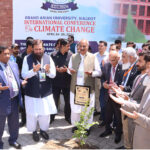ISLAMABAD, Apr 02 (APP): Experts have claimed that the country has recently emerged among the highly vulnerable and impacted countries due to climate change that demanded the stakeholders to invest in exploring Solar Geoengineering potential to reduce global warming impacts in the region to prevent erratic climate catastrophes.
Prof. Dr. Athar Hussain and Abdul Waheed from COMSATS University in their recent study article, have tried to research and analyze the Solar Geoengineering techniques and it’s possible outcomes with reference to Pakistan and other less developed countries facing equal climate risks and hazards.
The authors of the research based article are of the view that he anthropogenic activities have resulted in a high concentration of atmospheric greenhouse gases. This increase in emissions has caused an increase in the world temperature of the atmosphere.
“Climate engineering approaches aim to remove carbon dioxide from the atmosphere to address global warming’s worldwide effects. In this context, the approaches that reflect incoming sunlight back into space are technically called Solar Geoengineering.”
In recent years, global climate engineering plans and proposals have earned special diplomatic pull as a sort of an alternative option to address threatening global warming.
Climate Geoengineering particularly in upper air aims to reflect back a tiny fraction of incoming sunlight to the Earth, hence moderating the world climate patterns.
This approach can be achieved by releasing aerosols into the upper atmosphere to address impacts and climate change injustice. A wide variety of proposed interventions can be labeled as solar radiation modification. These vary in the scale of deployment, but all attempt to moderate warming.
The main proposed approach for Solar Geoengineering is a stratospheric aerosol injection whereby a deliberate injection of small reflective aerosols into the stratosphere could increase the reflection of incoming sunlight back to space, thus cooling the planet.
The stratospheric aerosol injection has not yet been tested outdoors, but large volcanic eruptions provide evidence that increasing stratospheric aerosols would cool the planet.
In this context, the US government, for the first time in 2019 has approved a grant of $1.4 trillion worth to research eoengineering.
The program includes assessments of “solar climate interventions,” and “proposals to inject material [into the stratosphere] to affect climate.” Experts think that since emissions cuts alone likely can’t prevent dangerous levels of climate change, public funding for Geoengineering research is “overdue”.
Pakistan contributes less than one percent of the world’s greenhouse gas emissions. However, the country is one of the most vulnerable nations to the climate change disaster crisis. According to the Global Climate Risk Index, Pakistan is in the top ten most vulnerable countries to climate change in the world.
Pakistan’s recent devastating floods of 2022 caused the death of more than 1,100 people, impacted more than 33 million people, and inflicted more than USD 30 billion in damages and economic losses.
According to the World Bank Report, issued in October 2022, the estimated need for rehabilitation and reconstruction in a resilient way is at least USD 16.3 billion. Therefore, on 9 January 2023 Government of Pakistan launched an USD 8 billion flood aid appeal at an International Conference on Resilient Pakistan in Geneva.
Pakistan exceeded target, raising more than USD 9 billion for flood recovery, a billion more than requested.
In the context of climate change governance, the Government of Pakistan launched a climate change policy first time in 2012, along with its implementation framework in 2013, which was updated in 2021.
Similarly, the climate change act was developed in 2017 to implement climate change policy instruments. The climate change policies depicted detailed climate change adaptation and mitigation measures and relevant action plans to address the climate change concerns of the country.
The need for Solar Geoengineering in Pakistan is likely due to the fact that the country is considered to be highly vulnerable to the impacts of climate change. Therefore, Pakistan needs to consider implementing Solar Geoengineering solutions in order to mitigate the effects of climate change and protect its population and economy.
Solar Geoengineering is a controversial topic, the opinions about it vary widely around the globe. Some experts argue that it is a necessary tool to combat climate change impacts that should be researched and implemented as soon as possible. Others argue that it is risky and that there is not enough understanding of the potential consequences to justify its use.
In this context, in case of Pakistan, since 2018, a group of scientists at the Center for Climate Research and Development at COMSATS University Islamabad conducted a study on “Impacts of sulfate aerosols on the climate of Pakistan”. Since late 2022, their study is funded by UK based The DEGREEs Initiative.
They concluded and recommended building a dialogue on science, governance, and policy at the national level. The climate models analyzed were the first step in determining the relative magnitude of the impact of sulfate aerosol injection in Pakistan.
Similarly, in 2022 authors of this article conducted a Resources for the Future (an independent, nonprofit research institution in Washington, DC) funded Solar Geoengineering research to analyze stakeholders’ perceptions, to improve understanding of the risks, potential benefits, and other uncertain implications of the solar geoengineering approach among three developing countries in global South (Pakistan, Nigeria, and Kenya).
This study examined their perspective via a total of more than 1000 respondent in diverse fields such as policymakers and research scholars.
Descriptive and inferential results indicate that there are significant differences within the global South on awareness of global warming and Solar Geoengineering, as well as on the deployment of sulfate aerosols as a measure to delay the harshest effects of global warming.
In Pakistan, there is a significant knowledge gap regarding the potential impacts and effectiveness of Solar Geoengineering. Some research on the subjec done though, much of it has been focused on its potential impacts on global climate patterns rather than on its specific effects in Pakistan. Furthermore, there is a lack of public awareness and education about Solar Geoengineering and its potential risks and benefits.
In this context, recently in February 2023, Ministry of Climate Change Government of Pakistan has invited universities and other research organizations to launch research work with a focus on scientific, technical security and geopolitical use of Solar Geoengineering to reduce the knowledge gap that halts the implementation of Solar Geoengineering.
Pakistan can also actively participate in international research efforts on Solar Geoengineering, and can consider the impacts of these technologies on its own region.







